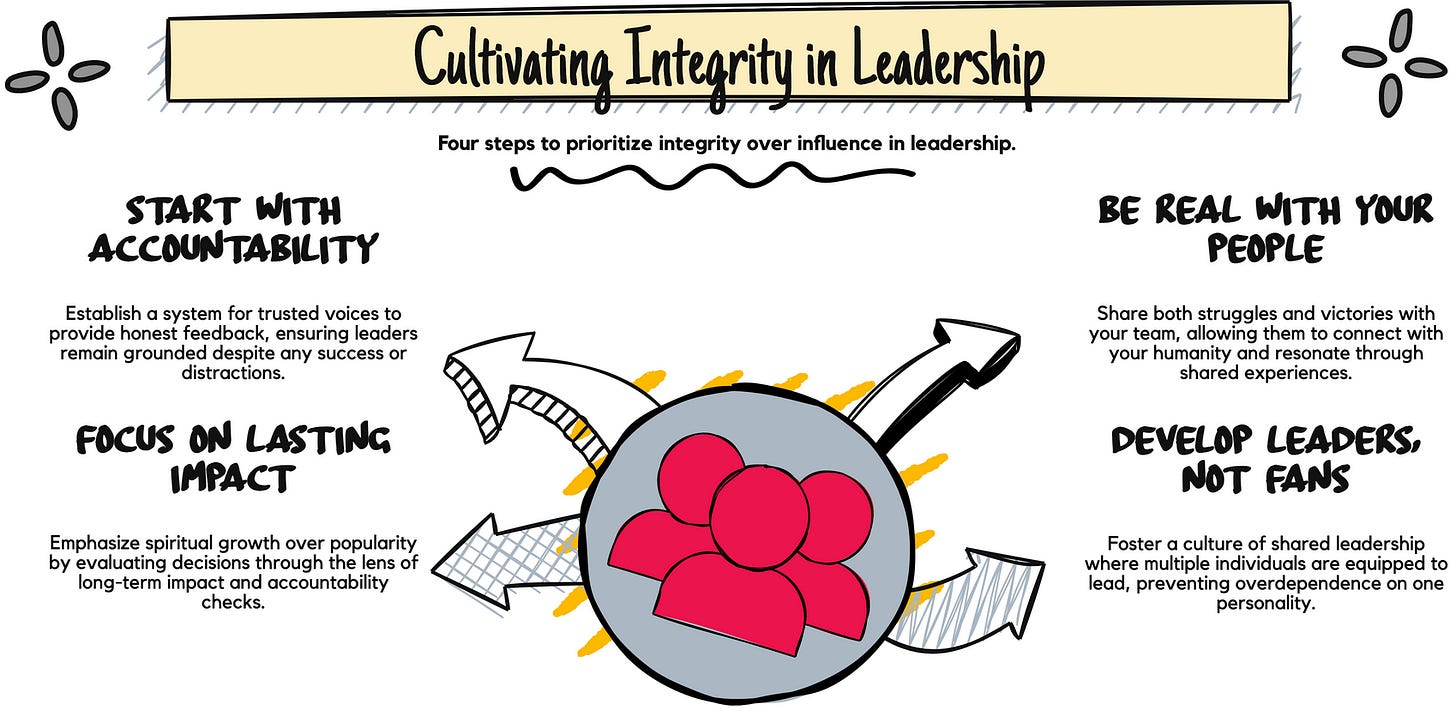Is Celebrity Leadership Killing the Church?
When influence becomes the goal, integrity gets lost. Have we allowed the phrase "growing the Kingdom" to become the most widely used excuse for Pastors to feed their flesh?
Is Celebrity Culture Killing the Church?
It doesn’t take much scrolling on social media to find a rapidly growing church with a pastor whose online presence is booming. The messages are getting shared, the following is growing, and you can’t seem to scroll instagram without seeing their presence. By all outward metrics, it looks like a leader on the rise.
But as recent trends are showing, far too many of these highly influential men of God are finding themselves at the center of controversy. It seems like every few months, another prominent pastor’s fall from grace makes headlines.
Now, to be clear, there are thousands of pastors leading with integrity who are faithfully caring for their congregations without chasing the spotlight. For every public failure, there are countless leaders staying grounded, keeping their hearts right, and prioritizing their calling over all else.
But we can’t ignore the patterns. It does raise an uncomfortable question:
Have we allowed the desire for a celebrity church culture to become a breeding ground for unhealthy leadership?
It’s an important question. Have we let the goal of “growing the Kingdom” become an all-too-common excuse for pastors and leaders to feed their flesh and build an army of followers who are more attached to their leadership than to Jesus?
In today’s church landscape, we’ve unintentionally created a system that rewards charisma over character. We’ve celebrated those who can fill a room but not necessarily those who can faithfully disciple. The result is a culture where visibility is often mistaken for effectiveness.
This is not just a church issue. It’s a leadership issue. It’s what happens when the desire to influence overtakes the commitment to integrity.
When leadership becomes more about influence than integrity, it’s not just the leader who suffers. It’s the whole community.
People become more attached to a personality than to the purpose they’re meant to follow.
Jesus addressed this very tension when He challenged His followers to think about the cost of pursuing worldly success over spiritual integrity.
“For what does it profit a man if he gains the whole world and loses or forfeits himself?”
— Luke 9:25 (ESV)
In Luke 9, Jesus speaks to the cost of following Him. Its more than just a warning. He’s calling out the human tendency to prioritize external success at the expense of internal wholeness.
And this is bigger than just church leaders. It’s a message that should resonate with anyone in a position of influence. Because in a world where metrics can be manipulated and platforms can be built overnight, it’s easy to lose sight of the real measure of leadership: faithfulness to the call of Christ and obedience to his word.
This scripture challenges us to examine our motives. Are we leading for the sake of Jesus or for the sake of being seen?
Just because your church is growing doesn’t mean your integrity is.
Influence CANNOT Become the Main Goal
There’s a reason why some of the most visible leaders in the church find themselves at the center of controversy. When influence becomes the ultimate goal, leaders start making decisions based on what will grow their platform, not what will honor God.
Our culture is obsessed with numbers like followers, likes, views which creates a constant temptation to measure success by reach rather than by the effectiveness of discipleship. But as we’ve seen, when influence becomes the priority, the foundations of integrity can start to erode.
If your platform outgrows your character, your influence will be at high risk daily.
If a pastor spends more time curating their social media presence than caring for the mission God has entrusted them with, the sermons may end up trending, but the anointing will fall whats neglected. The platform grows, but the leader becomes more isolated. Eventually, the gap becomes unsustainable, and the fallout is both personal and public.
The push to be more visible creates a unique challenge. The pressure to keep up appearances turns ministry into performance.
And people will eventually notice. People can sense when a message becomes more about impressing than actually serving the audience in need.
There’s a Cost to Celebrity Culture in the Church
When church culture mirrors celebrity culture, it shifts the focus from community to personality. Instead of building disciples, churches build fanbases who are willing to die on the hill they’ve built. The danger here is subtle but real. It turns a congregation from active participants in the Kingdom to passive consumers of content.
When leaders are led by fame, the congregation moves from the mission to the audience.
When a leader falls, it’s not just their reputation that’s at stake. It’s the faith of those who had attached their spiritual journey to that person. They feel let down, confused, and often spiritually disoriented.
And in the aftermath, they’ll be told that they were wrong to have placed more faith in the person than God. But what often gets ignored is the fact that the congregation thought they were.
Spiritual manipulation is a powerful abuse that has long lasting consequences for everyone who’s experienced it.
A church that builds its identity around a charismatic leader without surrounding them with accountability is walking a dangerous road. The discipleship of the leader needs to be cared for as much as anything else in the church. They need a team that not only supports them, but has permission to challenge them.
The church was built on Christ, not charisma. The leaders need to be built on that same philosophy.
Redefining Success in Ministry
We need to redefine what success looks like in church leadership. Instead of celebrating the loudest voices, we should celebrate the most consistent ones. And make no mistake about this, it could be both. The most charismatic can still be the most discipled.
But we have to be careful of elevating those who can simply draw a crowd.
Success in ministry isn’t about how many people know your name. It’s about how well you know the names of those you serve. It’s not about being popular. It’s about being present.
Your greatest leadership legacy won’t be your social following, it will be the lives you faithfully shepherd.
Building a Culture That Values Integrity Over Influence
It’s one thing to recognize the dangers of celebrity leadership. It’s another to actively build a culture that values integrity over influence. Real transformation requires intentional steps that keep the focus on faithfulness rather than fame. Here are four practical ways to ensure your leadership remains grounded, no matter how much your platform grows:
Start with Accountability:
Create a system where trusted voices can speak honestly into your life, especially when success starts to blur your vision. Give them permission to speak and search into the deeper parts of your life that can be hidden from public.Be Real with Your People:
Share your struggles as well as your victories. Don’t just present the highlights. Let them see your humanity. People have grace for what they resonate with. Many leaders struggle with the same things as the people they lead. The difference is that the leaders tend to hide it.Focus on Lasting Impact:
Ask yourself: Are you building followers for yourself or followers of Christ? Make decisions that prioritize long-term spiritual growth over short-term popularity. Allow your accountability system to run checks and balances on the decisions that are made to ensure it’s feeding the CORRECT kingdom.Develop Leaders, Not Fans:
Cultivate a culture where leadership is shared, not centered around one personality. Equip others to lead even when you’re not in the room. Understand this…if the operation doesn’t operate with a single person, it’s broken. No matter how large it gets, it’s broken.
At the end of the day, it’s time to get back to the heart of why we lead. Are we building our name or advancing His Kingdom? Are we creating disciples or just building a brand?
The health of the church will never be determined based on the size or the popularity of it’s leader. It will be determined by the faithfulness of those who lead.
Let’s be leaders who value character over charisma, who choose depth over popularity, and who prioritize being known by God over being known by people.
Blessings,
—Jared



